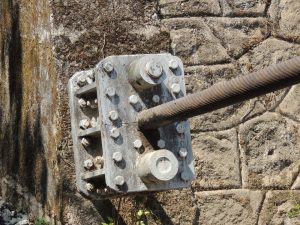
An anchor bolt is a used type of fastener that’s designed to connect one or more objects to a concrete surface. With concrete being brittle, you can use conventional bolts for applications such as this. To ensure the connected object or objects remains in place, you must use anchor bolts.
The Basics of Anchor Bolts
By definition, an anchor bolt is a heavy-duty fastener that’s used to connect objects to concrete. Steel poles, for example, are often mounted onto concrete surfaces using anchor bolts. The anchor bolts are driven through the base of the pole and into the concrete itself. Thanks to the unique design of anchor bolts, the pole remains stable and secure.
The Different Types of Anchor Bolts
All anchor bolts are designed to connect objects to concrete, but the way in which they perform this task varies depending on the type. The most common type of anchor bolt is cast in place. It’s called “cast in place” because it’s literally cast with concrete. To install a cast in place anchor bolt, you first drill an appropriately sized hole into the concrete surface. Next, you position the bolt into the hole. Finally, you pour wet concrete into the remaining space. The wet concrete will naturally surround the bolt, and once it hardens, the anchor bolt shouldn’t budge.
There are also drilled in place anchor bolts. Also known as post-installed anchor bolts, they don’t require the use of wet concrete. You simply drill them into hardened concrete. How do drilled in place anchor bolts work exactly? Some drilled in place anchor bolts rely on the properties of mechanical expansion. When you drill them into concrete, they’ll compress and/or expand. Other types of drilled in place anchor bolts require the use of adhesives, such as epoxy, to stabilize and prevent movement.
Forces That Affect Anchor Bolts
Several forces can work against anchor bolts and, therefore, affect their performance over time. If the object or objects to which the concrete is connected begins to fail, for instance, it can weaken the anchor bolts. Splitting is another potential problem with anchor bolts. If a split forms between the anchor bolts, they may come loose.
While anchor bolts aren’t immune to failure, they are less likely to fail when used in concrete applications than other types of bolts. As a result, most companies and contractors use anchor bolts when connecting one or more objects to a concrete surface.
